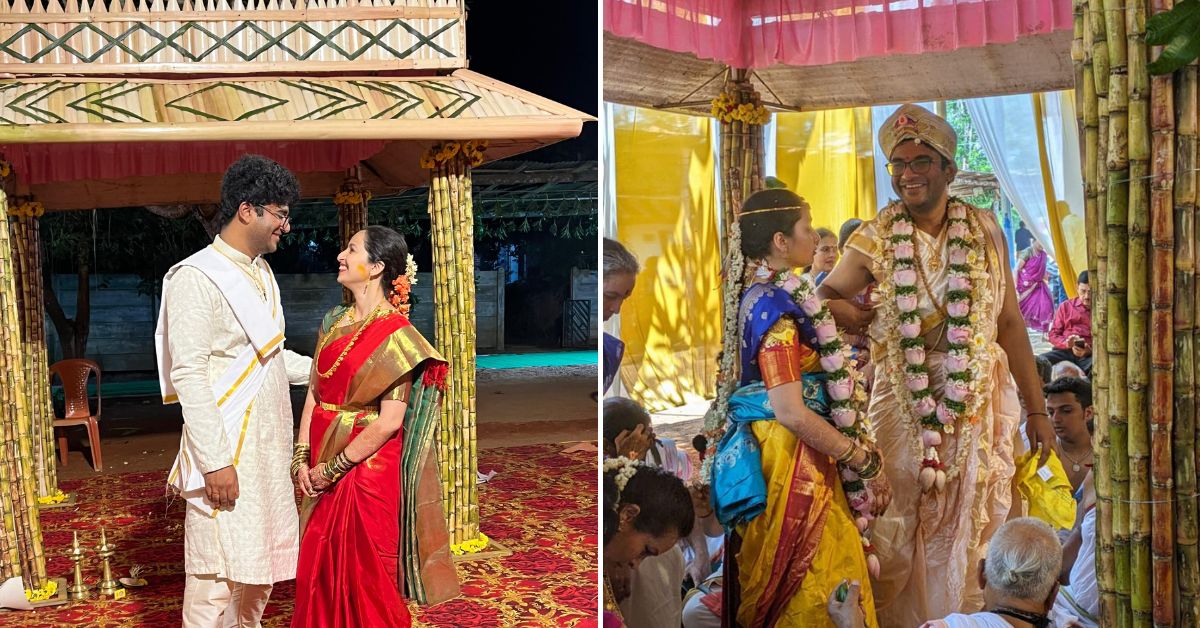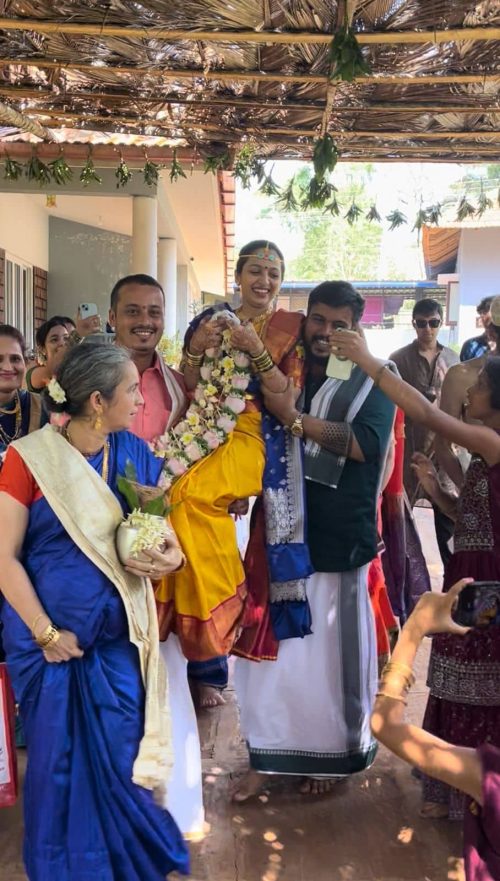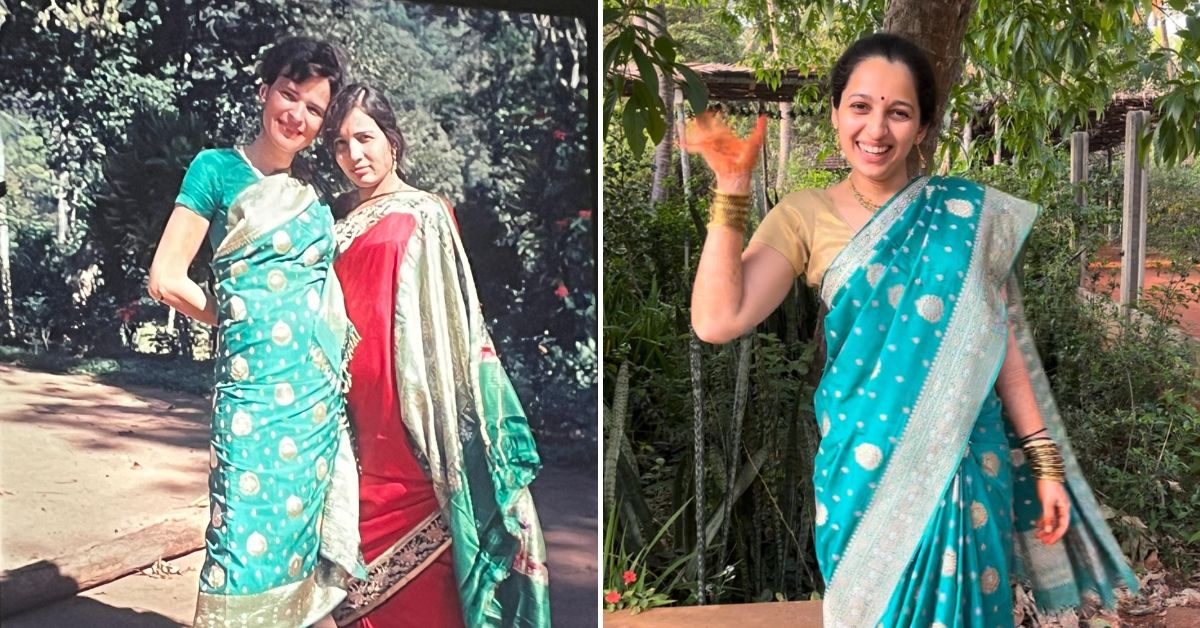One didn’t need a machine to travel back in time at Poorvi Bhat and Shamanth’s wedding. Held on a picturesque farm in Shivamogga, Karnataka, the event felt like a scene straight out of a 1960s wedding.
It had everything a wedding needed: two people in love, happy families, loads of joy, scrumptious food, and abundant happiness. What it didn’t have was plastic or of any kind — whether food, plastic, or paper. The beauty of the union was enhanced by the simplicity of the setting, surrounded by coconut trees, areca palms, mangoes, and lush greenery.
It was everything the bride had dreamed of since she was a little girl! Whenever anyone asked Poorvi, a nutritionist and naturopath, what she wanted for her big day, her answer remained the same over the years: a simple, eco-friendly wedding at her family farm.
When she decided to marry her husband, an organic farmer, his family readily agreed to her non-negotiable requirement of a sustainable wedding.

The sugarcane mantapa later doubled up as a meal for the cows!
From a sugarcane mantapa (wedding pavilion) to decorations using mango and coconut leaves from the farm, to a handwash where the water was recycled into the farm, to steel cutlery and banana leaves, every aspect was meticulously planned. All the wet waste was composted in the farm’s vermicompost pit, and the mantapa was chopped up and served as a delicious meal for cows!
At the end of the two-day event, the venue was spotlessly clean, with all waste returned to mother nature. Here’s how the family pulled it together:
Dr Poorvi’s childhood was rooted in sustainability, where it was a way of life.
“My father has been running this organic farm for over 40 years. Everything there is composted and these are general practices followed in villages. My parents follow these principles in their everyday life too,” Poorvi tells The Better India.

The decorations were all locally sourced and were later composted at the farm.
When it came to her wedding, it was clear that she wanted to follow the same principles. She realised that all she needed to do was seek inspiration from weddings held three to four decades ago, like her parents’. Before the advent of small plastic bottles and large budgets, weddings were , weren’t they?
Wanting to have a simple wedding with a few guests, the chosen venue was the family farm. The next step was decorations.
“We decided to go local. We chose locally available mango and coconut leaves for decorations, which could be composted too. While reusable steel mantapas are available, we chose to go with a sugarcane one as it is traditionally used and grows in Shivamogga. It is also something that our cows love,” says Poorvi.
When she shared her vision with the decorators, they came up with more ideas and were excited about not using plastic. They ensured that the aesthetics weren’t compromised.
The next and biggest step was catering, where most of the waste is generated during weddings.
A Down to Earth report suggests that 10 to 15 percent of food is wasted at every wedding, with a minimum of 50 kg and up to 800 kg. During the 23-day ‘shaadi season’ from November to December 2023, the country witnessed over 3.5 million weddings. Imagine the amount of food wasted.
To prevent any waste, the family decided against using plastic bottles or paper cups. They rented steel cutlery and used an auto-clean machine to wash and sterilise it. They also served food on traditional banana leaves.
“We opted for a local menu using freshly grown seasonal ingredients. We had the machine to ensure that the cutlery was clean. We had big reusable water cans for drinking water,” adds the bride.
For washing hands, they placed drums of water with mugs in a strategic location where the water would directly go to the mango trees. They refrained from installing taps to prevent excess water usage.
To prevent food wastage, they instructed the caterers to serve in small quantities and as per the guest’s wishes. “We usually have a habit of serving large quantities of food which most people can’t eat. We wanted the guests to be happy and therefore served small portions, which could be refilled at will,” she adds.
Additionally, all the food that remained was packed and given to neighbours and farm workers in their own steel dabbas. The used banana leaves and food were composted in the vermicompost pit on the farm. To ensure that the cows too didn’t miss the feast, the mantapa was chopped up and fed to them.
The garlands too were made using local flowers and a cotton thread, shares Poorvi. The flowers, along with the leaves used for decorations were
The return gifts were given in reusable jute bags. And the boxes, which carried the sarees and clothes bought for guests, were sent for recycling.
The bride did her own makeup, with her aunts helping with saree draping and friends doubling as hairstylists. Nearly 80 percent of her bridal trousseau consisted of old sarees and sarees from her family members.

Poorvi wore her grandmother’s friend’s 50-year-old saree as part of her bridal trousseau.
She even wore a 50-year-old saree! (Insert pic) “My grandmother had gifted this saree to her best friend 50 years ago. She in turn gifted it to me now,” smiles the Bengaluru resident.
The two-day wedding was a joyous time for the families, guests and most importantly, the environment too! “We just need to look back a few years ago and draw inspiration from our ancestors. We didn’t innovate, just followed what our parents have been doing!” she remarks.
While many might feel that sustainable weddings are more expensive, the nutritionist begs to disagree. She shares that rentals are not very costly, when compared to the cost of one bottle of packaged drinking water.
“There are many who help with planning such events in larger cities. There are people who help compost and recycle your waste too. Focus on enjoying the wedding the way it was meant to be,” advises Poorvi.
Edited by Pranita Bhat; Images Courtesy Poorvi Bhat.
It had everything a wedding needed: two people in love, happy families, loads of joy, scrumptious food, and abundant happiness. What it didn’t have was plastic or of any kind — whether food, plastic, or paper. The beauty of the union was enhanced by the simplicity of the setting, surrounded by coconut trees, areca palms, mangoes, and lush greenery.
It was everything the bride had dreamed of since she was a little girl! Whenever anyone asked Poorvi, a nutritionist and naturopath, what she wanted for her big day, her answer remained the same over the years: a simple, eco-friendly wedding at her family farm.
When she decided to marry her husband, an organic farmer, his family readily agreed to her non-negotiable requirement of a sustainable wedding.

The sugarcane mantapa later doubled up as a meal for the cows!
From a sugarcane mantapa (wedding pavilion) to decorations using mango and coconut leaves from the farm, to a handwash where the water was recycled into the farm, to steel cutlery and banana leaves, every aspect was meticulously planned. All the wet waste was composted in the farm’s vermicompost pit, and the mantapa was chopped up and served as a delicious meal for cows!
At the end of the two-day event, the venue was spotlessly clean, with all waste returned to mother nature. Here’s how the family pulled it together:
Going back to the basics
Dr Poorvi’s childhood was rooted in sustainability, where it was a way of life.
“My father has been running this organic farm for over 40 years. Everything there is composted and these are general practices followed in villages. My parents follow these principles in their everyday life too,” Poorvi tells The Better India.

The decorations were all locally sourced and were later composted at the farm.
When it came to her wedding, it was clear that she wanted to follow the same principles. She realised that all she needed to do was seek inspiration from weddings held three to four decades ago, like her parents’. Before the advent of small plastic bottles and large budgets, weddings were , weren’t they?
Wanting to have a simple wedding with a few guests, the chosen venue was the family farm. The next step was decorations.
“We decided to go local. We chose locally available mango and coconut leaves for decorations, which could be composted too. While reusable steel mantapas are available, we chose to go with a sugarcane one as it is traditionally used and grows in Shivamogga. It is also something that our cows love,” says Poorvi.
When she shared her vision with the decorators, they came up with more ideas and were excited about not using plastic. They ensured that the aesthetics weren’t compromised.
The next and biggest step was catering, where most of the waste is generated during weddings.
A Down to Earth report suggests that 10 to 15 percent of food is wasted at every wedding, with a minimum of 50 kg and up to 800 kg. During the 23-day ‘shaadi season’ from November to December 2023, the country witnessed over 3.5 million weddings. Imagine the amount of food wasted.
To prevent any waste, the family decided against using plastic bottles or paper cups. They rented steel cutlery and used an auto-clean machine to wash and sterilise it. They also served food on traditional banana leaves.
“We opted for a local menu using freshly grown seasonal ingredients. We had the machine to ensure that the cutlery was clean. We had big reusable water cans for drinking water,” adds the bride.
For washing hands, they placed drums of water with mugs in a strategic location where the water would directly go to the mango trees. They refrained from installing taps to prevent excess water usage.
To prevent food wastage, they instructed the caterers to serve in small quantities and as per the guest’s wishes. “We usually have a habit of serving large quantities of food which most people can’t eat. We wanted the guests to be happy and therefore served small portions, which could be refilled at will,” she adds.
Additionally, all the food that remained was packed and given to neighbours and farm workers in their own steel dabbas. The used banana leaves and food were composted in the vermicompost pit on the farm. To ensure that the cows too didn’t miss the feast, the mantapa was chopped up and fed to them.
The garlands too were made using local flowers and a cotton thread, shares Poorvi. The flowers, along with the leaves used for decorations were
The return gifts were given in reusable jute bags. And the boxes, which carried the sarees and clothes bought for guests, were sent for recycling.
A minimalist bride
The bride did her own makeup, with her aunts helping with saree draping and friends doubling as hairstylists. Nearly 80 percent of her bridal trousseau consisted of old sarees and sarees from her family members.

Poorvi wore her grandmother’s friend’s 50-year-old saree as part of her bridal trousseau.
She even wore a 50-year-old saree! (Insert pic) “My grandmother had gifted this saree to her best friend 50 years ago. She in turn gifted it to me now,” smiles the Bengaluru resident.
The two-day wedding was a joyous time for the families, guests and most importantly, the environment too! “We just need to look back a few years ago and draw inspiration from our ancestors. We didn’t innovate, just followed what our parents have been doing!” she remarks.
While many might feel that sustainable weddings are more expensive, the nutritionist begs to disagree. She shares that rentals are not very costly, when compared to the cost of one bottle of packaged drinking water.
“There are many who help with planning such events in larger cities. There are people who help compost and recycle your waste too. Focus on enjoying the wedding the way it was meant to be,” advises Poorvi.
Edited by Pranita Bhat; Images Courtesy Poorvi Bhat.
